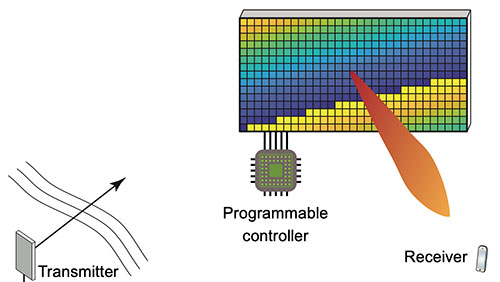Configuring an Intelligent Reflecting Surface for Wireless Communications
The IEEE Signal Processing Society is proud to announce the eighth edition of the Signal Processing Cup: an exciting challenge to control a wireless propagation environment using an intelligent reflecting surface.
An intelligent reflecting surface is a two-dimensional array of metamaterial whose interaction with electromagnetic waves can be controlled, e.g., by tuning the impedance variations over the surface. These surfaces might be used in the sixth generation (6G) mobile technology to direct wireless signals from a transmitter towards a receiver, to raise the communication performance. The goal of the challenge is to characterize the behavior of an intelligent reflecting surface based on received signals from an over-the-air signaling phase and develop a control algorithm to configure the surface to aid wireless communications.
See the video introduction about the competition: https://youtu.be/Uy7lHEm-Ou0
See the summary video about the competition: https://youtu.be/vsCJqzKvtF8
Winning team: T – Cubed, University of Moratuwa, Sri Lanka
First runner-up: Team AGH, AGH University of Science and Technology, Poland
Second runner-up: UnBounded, University of Brasilia, Brazil
You can find descriptions of their solutions on YouTube: https://youtube.com/playlist?list=PLTv48TzNRhaIs9JZ1RqxTVdBjCMUYGdki
A detailed description of the IEEE Signal Processing Cup 2021 is found in the document description.pdf in this repository.
Here is brief information about the competition aspects:
Team composition: The purpose of this competition is that teams of 3-10 undergraduate students (enrolled as Bachelor or Master students) compete and develop a solution, under the supervision of a faculty member (or someone else with a PhD degree) and (optionally) the tutorship of a PhD student or postdoc. It is the undergraduate students that are responsible for presenting their work on ICASSP 2021, if the team makes it to the final competition (see below). Detailed eligibility criteria are provided in the document description.pdf
Dataset: A novel dataset with transmitted and received signals, for different configurations, is provided for the challenge.
Prize: The three teams with highest performance in the open competition will be selected as finalists and will be invited to participate in the final competition at ICASSP 2021. The champion team will receive a grand prize of $5,000. The first and the second runner-up will receive a prize of $2,500 and $1,500, respectively.
Sponsorship: We gratefully acknowledge MathWorks, Inc. for their continued support of the IEEE Signal Processing Cup. Participating students are encouraged to download the complimentary Mathworks Student Competitions Software for use in the competition.
The datasets (1.6 GB) are no longer available for direct download, but can be generated by running generateDatasets.m in the folder Code_solutions It can take several hours to generate the dataset.
We use Piazza as Q/A platform: https://piazza.com/ieee_sps/spring2021/spcup2021/home
Details about the dataset that were not disclosed during the competition, as well as the organizer's sample solution, are found in the paper "Optimizing a Binary Intelligent Reflecting Surface for OFDM Communications under Mutual Coupling", arXiv:2106.04280
The related code is provided in the folder Code_solutions, where:
generateDatasets.m: Used generate the dataset testrate.m: Used to evaluate the rates and metric for a given set of configurations trueParameters.mat: Contains the true channel, needed to evaluate the rates plotFigureX.m: Used to create Figure X from the the paper mentioned above
The remaining functions are called by the files mentioned above
A tutorial article that brings you up to speed on the modeling and properties of this technology is:
Emil Björnson, Henk Wymeersch, Bho Matthiesen, Petar Popovski, Luca Sanguinetti, Elisabeth de Carvalho, "Reconfigurable Intelligent Surfaces: A Signal Processing Perspective With Wireless Applications", arXiv:2102.00742.
Release of the dataset and detailed instructions: February 1, 2021
Registration of team (see below): March 1, 2021
Submission deadline: May 9, 2021
Finalists announced: May 12, 2021
Final at ICASSP (virtual conference): June 6, 2021
Each team must register by March 1 in the following IEEE system:
https://www2.securecms.com/SPCup/SPCRegistration.asp
At least one member per team should also sign up to the Q/A platform Piazza (see below) to get announcements about events, changes in the instructions, and summarizes of Q/A.

